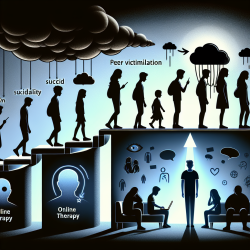Introduction
In the realm of adolescent mental health, the interplay between risk factors and resilience is critical in understanding and mitigating suicidality. The recent study titled "Contribution of Risk and Resilience Factors to Suicidality among Mental Health-Help-Seeking Adolescent Outpatients: A Cross-Sectional Study" provides valuable insights into how resilience can serve as a protective factor against suicidality, even in the presence of significant risk factors like peer victimization.
Understanding the Research
The study conducted a comprehensive assessment of 104 adolescents seeking mental health help, focusing on the correlation between peer victimization, resilience factors, and suicidality. The findings revealed that while peer victimization significantly increases the risk of suicidality (odds ratio [OR] = 3.84), resilience factors inversely correlate with suicidality risk (OR = 0.28). This suggests that bolstering resilience can significantly reduce suicidality, even among those experiencing high levels of peer victimization.
Key Resilience Factors
The study identifies several key resilience factors that practitioners can focus on to mitigate suicidality risk:
- Emotion Regulation: The ability to manage and respond to emotional experiences effectively.
- Self-Reliance: Confidence in one's ability to handle challenges independently.
- Positive Relationships: Supportive interactions with family and peers.
- Neighborhood Safety: Perceptions of safety and trust within one's community.
Implications for Practitioners
For practitioners, these findings underscore the importance of integrating resilience-building strategies into therapeutic interventions. Here are some practical steps to consider:
- Focus on Emotion Regulation: Implement techniques such as mindfulness and cognitive-behavioral strategies to enhance emotional regulation skills in adolescents.
- Strengthen Support Networks: Encourage the development of positive relationships with family and peers, and foster a supportive community environment.
- Promote Self-Reliance: Help adolescents build confidence in their ability to navigate challenges independently through skill-building activities.
- Enhance Environmental Safety: Work with community organizations to improve perceptions of safety and trust within neighborhoods.
Encouraging Further Research
While this study provides a robust foundation, further research is needed to explore the longitudinal effects of resilience interventions on suicidality. Practitioners are encouraged to engage in ongoing research and contribute to the growing body of knowledge in this field.
To read the original research paper, please follow this link: Contribution of Risk and Resilience Factors to Suicidality among Mental Health-Help-Seeking Adolescent Outpatients: A Cross-Sectional Study.










